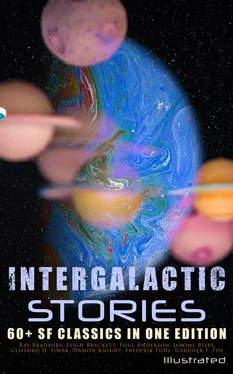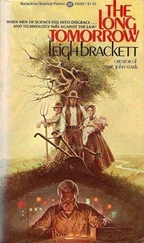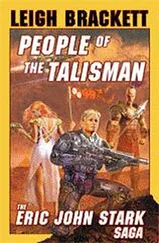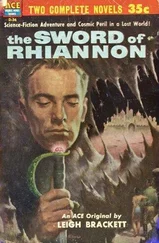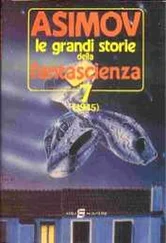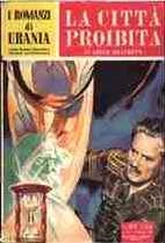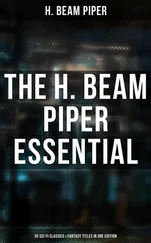Night deepened toward the ship, a river of indigo flowing out of the west. The man known as Stark stood alone by the after rail and watched its coming. He was full of impatience and a gathering sense of danger, so that it seemed to him that even the hot wind smelled of it.
The steersman lay drowsily over his sweep. He was a big man, with skin and hair the color of milk. He did not speak, but Stark felt that now and again the man's eyes turned toward him, pale and calculating under half-closed lids, with a secret avarice.
The captain and the two other members of the little coasting vessel's crew were forward, at their evening meal. Once or twice Stark heard a burst of laughter, half-whispered and furtive. It was as though all four shared in some private joke, from which he was rigidly excluded.
The heat was oppressive. Sweat gathered on Stark's dark face. His shirt stuck to his back. The air was heavy with moisture, tainted with the muddy fecundity of the land that brooded westward behind the eternal fog.
There was something ominous about the sea itself. Even on its own world, the Red Sea is hardly more than legend. It lies behind the Mountains of White Cloud, the great barrier wall that hides away half a planet. Few men have gone beyond that barrier, into the vast mystery of Inner Venus. Fewer still have come back.
Stark was one of that handful. Three times before he had crossed the mountains, and once he had stayed for nearly a year. But he had never quite grown used to the Red Sea.
It was not water. It was gaseous, dense enough to float the buoyant hulls of the metal ships, and it burned perpetually with its deep inner fires. The mists that clouded it were stained with the bloody glow. Beneath the surface Stark could see the drifts of flame where the lazy currents ran, and the little coiling bursts of sparks that came upward and spread and melted into other bursts, so that the face of the sea was like a cosmos of crimson stars.
It was very beautiful, glowing against the blue, luminous darkness of the night. Beautiful, and strange.
There was a padding of bare feet, and the captain, Malthor, came up to Stark, his outlines dim and ghostly in the gloom.
"We will reach Shuruun," he said, "before the second glass is run."
Stark nodded. "Good."
The voyage had seemed endless, and the close confinement of the narrow deck had got badly on his nerves.
"You will like Shuruun," said the captain jovially. "Our wine, our food, our women—all superb. We don't have many visitors. We keep to ourselves, as you will see. But those who do come...."
He laughed, and clapped Stark on the shoulder. "Ah, yes. You will be happy in Shuruun!"
It seemed to Stark that he caught an echo of laughter from the unseen crew, as though they listened and found a hidden jest in Malthor's words.
Stark said, "That's fine."
"Perhaps," said Malthor, "you would like to lodge with me. I could make you a good price."
He had made a good price for Stark's passage from up the coast. An exorbitantly good one.
Stark said, "No."
"You don't have to be afraid," said the Venusian, in a confidential tone. "The strangers who come to Shuruun all have the same reason. It's a good place to hide. We're out of everybody's reach."
He paused, but Stark did not rise to his bait. Presently he chuckled and went on, "In fact, it's such a safe place that most of the strangers decide to stay on. Now, at my house, I could give you...."
Stark said again, flatly, "No."
The captain shrugged. "Very well. Think it over, anyway." He peered ahead into the red, coiling mists. "Ah! See there?" He pointed, and Stark made out the shadowy loom of cliffs. "We are coming into the strait now."
Malthor turned and took the steering sweep himself, the helmsman going forward to join the others. The ship began to pick up speed. Stark saw that she had come into the grip of a current that swept toward the cliffs, a river of fire racing ever more swiftly in the depths of the sea.
* * * * *
The dark wall seemed to plunge toward them. At first Stark could see no passage. Then, suddenly, a narrow crimson streak appeared, widened, and became a gut of boiling flame, rushing silently around broken rocks. Red fog rose like smoke. The ship quivered, sprang ahead, and tore like a mad thing into the heart of the inferno.
In spite of himself, Stark's hands tightened on the rail. Tattered veils of mist swirled past them. The sea, the air, the ship itself, seemed drenched in blood. There was no sound, in all that wild sweep of current through the strait. Only the sullen fires burst and flowed.
The reflected glare showed Stark that the Straits of Shuruun were defended. Squat fortresses brooded on the cliffs. There were ballistas, and great windlasses for the drawing of nets across the narrow throat. The men of Shuruun could enforce their law, that barred all foreign shipping from their gulf.
They had reason for such a law, and such a defense. The legitimate trade of Shuruun, such as it was, was in wine and the delicate laces woven from spider-silk. Actually, however, the city lived and throve on piracy, the arts of wrecking, and a contraband trade in the distilled juice of the vela poppy.
Looking at the rocks and the fortresses, Stark could understand how it was that Shuruun had been able for more centuries than anyone could tell to victimize the shipping of the Red Sea, and offer a refuge to the outlaw, the wolf's-head, the breaker of tabu.
With startling abruptness, they were through the gut and drifting on the still surface of this all but landlocked arm of the Red Sea.
Because of the shrouding fog, Stark could see nothing of the land. But the smell of it was stronger, warm damp soil and the heavy, faintly rotten perfume of vegetation half jungle, half swamp. Once, through a rift in the wreathing vapor, he thought he glimpsed the shadowy bulk of an island, but it was gone at once.
After the terrifying rush of the strait, it seemed to Stark that the ship barely moved. His impatience and the subtle sense of danger deepened. He began to pace the deck, with the nervous, velvet motion of a prowling cat. The moist, steamy air seemed all but unbreathable after the clean dryness of Mars, from whence he had come so recently. It was oppressively still.
Suddenly he stopped, his head thrown back, listening.
The sound was borne faintly on the slow wind. It came from everywhere and nowhere, a vague dim thing without source or direction. It almost seemed that the night itself had spoken—the hot blue night of Venus, crying out of the mists with a tongue of infinite woe.
It faded and died away, only half heard, leaving behind it a sense of aching sadness, as though all the misery and longing of a world had found voice in that desolate wail.
Stark shivered. For a time there was silence, and then he heard the sound again, now on a deeper note. Still faint and far away, it was sustained longer by the vagaries of the heavy air, and it became a chant, rising and falling. There were no words. It was not the sort of thing that would have need of words. Then it was gone again.
Stark turned to Malthor. "What was that?"
The man looked at him curiously. He seemed not to have heard.
"That wailing sound," said Stark impatiently.
"Oh, that." The Venusian shrugged. "A trick of the wind. It sighs in the hollow rocks around the strait."
* * * * *
He yawned, giving place again to the steersman, and came to stand beside Stark. The Earthman ignored him. For some reason, that sound half heard through the mists had brought his uneasiness to a sharp pitch.
Civilization had brushed over Stark with a light hand. Raised from infancy by half-human aboriginals, his perceptions were still those of a savage. His ear was good.
Malthor lied. That cry of pain was not made by any wind.
Читать дальше
